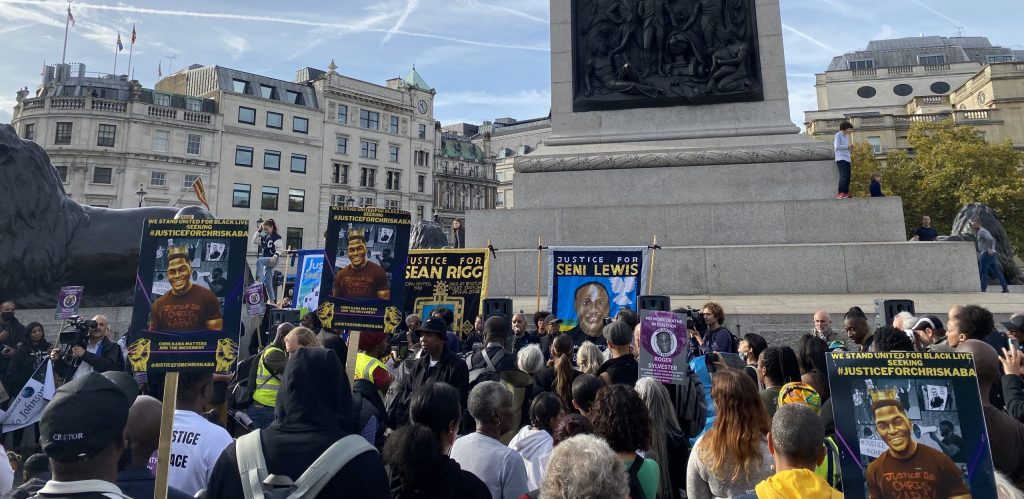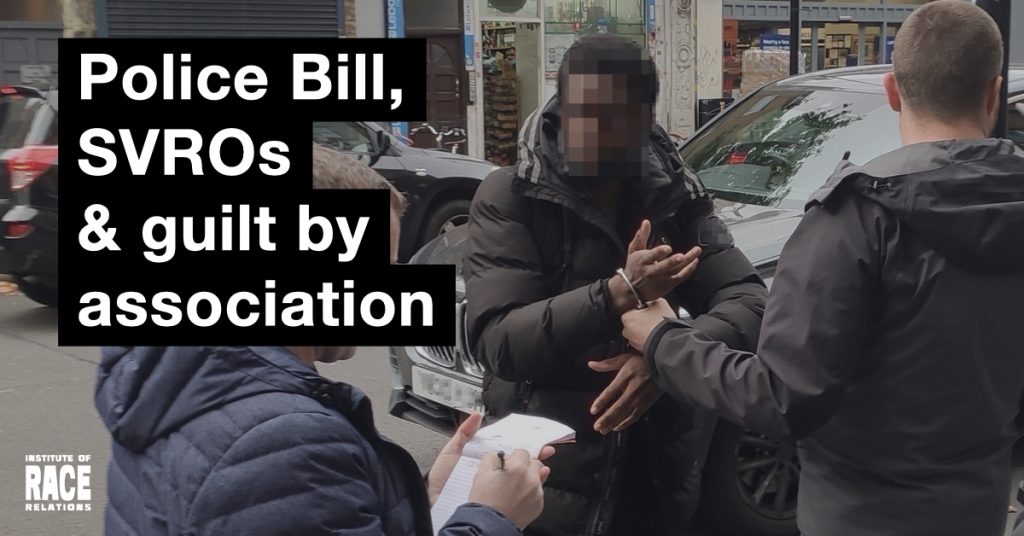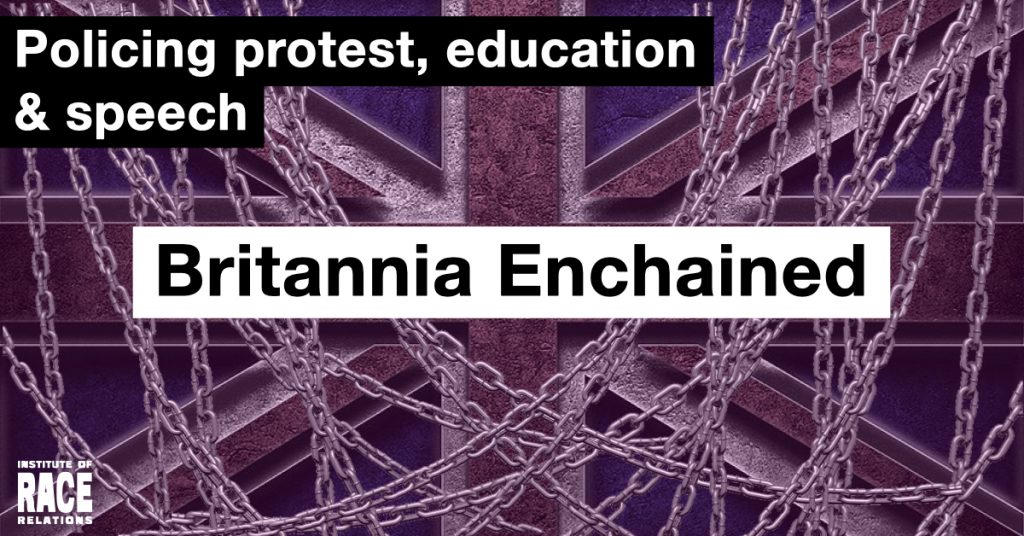Policing protest
In the government’s list of internal enemies or risks to public order and tranquillity, environmental and climate activists have for some time been up there with Black communities, Muslims, anti-racists and anti-fascists. The Police, Crime, Sentencing and Courts Act was bulldozed through to Royal Assent in April despite the Lords’ tenacity in repeatedly voting against interference with protest and assembly rights. The provisions the Lords managed to block – offences of locking on and going equipped for locking on, interference with transport and key national infrastructure, suspicionless stop and search in an area where a protest is taking place,[i] and serious disruption prevention orders (SDPOs) – were repackaged as the Public Order Bill, introduced in the Commons in May. It passed its Commons stages in October with the addition of yet more offences, and ministerial powers to obtain injunctions with powers of arrest. A late amendment to the Bill, enabling police to abort a protest before it starts, was voted down by the House of Lords in February 2023.

SDPOs, to prevent the commission of protest-related offences or the risk of serious disruption, can be imposed for up to two years (thereafter renewable yearly) on anyone who has, in the past five years, been convicted of a protest-related offence, OR involved in OR contributed to ‘disruptive activities’. [ii] An order, made by a court on conviction of a protest-related offence OR on a complaint by a police chief, may include conditions of reporting to police; notifying name, address and changes of residence; curfew; electronic monitoring; and bans on entering specified places, meeting specified people, having specified articles, participating in specified activities or using the internet to facilitate or encourage offences or disruptive activities. A breach of the order attracts a prison sentence of up to 51 weeks. The Secretary of State may issue guidance on who to target, to which police chiefs must have regard.
These provisions are modelled partly on Serious Violence Reduction Orders (SVROs), legislated for in the Police, Crime, Sentencing and Courts Act: orders on conviction of an offence involving a weapon or bladed article, whether used or carried by the offender or by someone else which the offender knew or should have known about. The existence of an order, which can last for up to two years (then renewable yearly) and may be accompanied by a Knife Crime Prevention Order or a Gang Injunction, allows search of the subject in a public place at any time. The subject must notify police of their current address, and the Act empowers the minister to set out additional conditions which can be imposed through regulations (none yet issued).

The fields of terrorism and immigration provide even closer models for the protest-related orders. It is there – in control orders and their successors, Terrorism Prevention and Investigation Measures (TPIMs), and in immigration bail in relation to national security deportation, that you see the curfews, bans on movement, association and use of the internet, and electronic monitoring now extended to the field of protest – and the psychological devastation wrought by these conditions of life.
The courts contributed to the crackdown, granting injunctions against ‘persons unknown’ to prevent ‘disruptive’ protest along the entire route of HS2, the controversial high-speed railway being built between London and Crewe via the West Midlands; the breadth of the injunctions allowing for new arrivals on a protest to be arrested for contempt of court.
Policing investigation, education and speech
In November, it emerged that four journalists covering Just Stop Oil protests on the M25 in Hertfordshire had been arrested on the orders of senior police officers. Under the National Security Bill, which will replace the Official Secrets Acts, journalists working for foreign news outlets such as RTE or Al Jazeera, or for NGOs including Reprieve and Privacy International, in receipt of funding from foreign governments, could face imprisonment for reporting ‘protected information’ – information subject to any restriction – deemed ‘prejudicial to the safety or interests of the UK’, defined as ‘the objects of state policy’ – which goes much wider than national security, and which ministers would define. There is no ‘public interest’ defence, nor an independent commissioner to whom whistle-blowers could go, despite recommendations by the Law Commission.
On the day after a racist petrol-bomb attack on a Kent migrant processing centre, home secretary Suella Braverman described the migrants crossing the Channel as an ‘invasion’, provoking the resignation of Home Office adviser Nimco Ali, who said the language legitimises racist incidents, and refusing to apologise even when Holocaust survivor Joan Salter rebuked her. While Braverman and immigration minister Jenrick claim the freedom to vilify and dehumanise migrants, and the Higher Education (Free Speech) Bill championed by controversial right-wing groups nears Royal Assent, to prevent university campuses from barring ‘controversial’ views among students, staff or speakers, Rishi Sunak pledged to crack down on those ‘vilifying’ the ‘beacon of freedom, tolerance and diversity’ that is the United Kingdom, by defining them as extremists.In February, then education secretary Nadhim Zahawi issued statutory guidance on political impartiality in schools which warns against teaching about colonialism and imperialism in a ‘partisan’ way, and in March the government indicated that a ‘model history curriculum’ would be drawn up by 2024. The Schools Bill, introduced in May, was designed to bring all schools into multi-academy trusts (MATs) and to bring these under central government control and although it was shelved in December following strong opposition, the government ‘remains committed to its objectives’ and we can expect further attempts to police schools, as well as their pupils, soon.[iii] And the 2022 Queen’s Speech included a proposed bill banning local authorities from using human rights criteria to make investment and procurement decisions, or in the government’s words ‘stop public bodies from adopting their own approach to international relations’ (the anti-BDS Bill).

